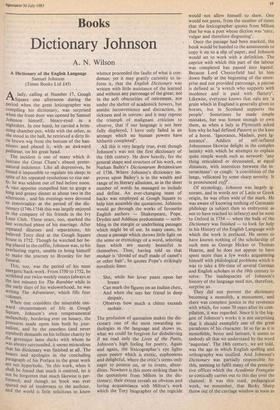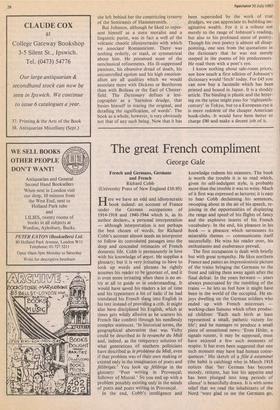Books
Dictionary Johnson
A. N. Wilson
Alady, calling at Number 17, Gough Square one afternoon during the period when the great lexicographer was Compiling his dictionary, was surprised when the front door was opened by Samuel Johnson himself, bleary-eyed in a nightshirt. In one hand, he carried a brim- ming chamber-pot, while with the other, as she stood in the hall, he retrieved a dirty lit- tle brown wig from the bottom of the ban- nisters and placed it, with an dwkward politesse, on his great head.
The incident is one of many which il- lustrate the Great Cham's almost preter- natural indolence. Like all depressives, he found it impossible to regulate his sleep; in spite of his repeated resolutions to rise ear- ly, he was seldom out of bed before noon. A vast appetite compelled him to gorge a long and greasy dinner at about two in the afternoon , and his evenings were devoted to conviviality: at the period of the dic- tionary (1746-1754) this was largely enjoyed ih the company of his friends in the Ivy Lane Club. These years, too, marked the last wretched phase of his marriage. After repeated illnesses and separations, his beloved Tetty died at the Gough Square house in 1752. Though he watched her be- ing placed in the coffin, Johnson was, to his everlasting regret, unable to bring himself to make the journey to Bromley for her funeral.
This, too, was the period of his most energetic hack-work. From 1750 to 1752, he scribbled out twice-weekly essays (always at the last minute) for The Rambler while in the early days of his widowerhood, he was writing The Adventurer, which fills four volumes.
When one considers the miserable out- ward circumstances of life in Gough Square, Johnson's own temperamental melancholy, bordering ever on lunacy, the pressures made upon him both by jour- nalism, and by the ceaseless (and never repulsed) demands on his infinite charity by the grotesque lame ducks with whom he was always surrounded, it seems miraculous that his dictionary was finished at all. The boasts and apologies in the concluding Paragraph of his Preface to the great work are not hyperbolic. 'In this work, when it shall be found that much is omitted, let it not be forgotten that much likewise is per- formed; and though no book was ever spared out of tenderness to the authour, and the world is little solicitous to know
whence proceeded the faults of what it con- demns; yet it may gratify curiosity to in- form it, that the English Dictionary was written with little assistance of the learned and without any patronage of the great; not in the soft obscurities of retirement, nor under the shelter of academick bowers, but amidst inconvenience and distraction, in sickness and in sorrow: and it may repress the triumph of malignant criticism to observe, that if our language is not here fully displayed, I have only failed in an attempt which no human powers have hithertb completed'.
All this is very largely true, even though Johnson's was not the first dictionary of the 18th century. He drew heavily, •for the general shape, and structure of his work, on Nathan Bailey's Dictionarum Britannicum of 1736. Where Johnson's dictionary im- proves upon Bailey's is in the wealth and range of its literary allusions, as in the sheer number of words he managed to include and define. An ever-changing team of hacks was employed at Gough Square to help him assemble the quotations. Johnson would go through the works of favourite English authors — Shakespeare, Pope, Dryden and Addison predominate — scrib- bling in the margin or underlining passages which might be of use. In many cases, he chose a passage which throws little light on the sense or etymology of a word, selecting lines which are merely beautiful in themselves. Thus, having told us that mohair is 'thread of stuff made of camel's or other hair', he quotes Pope's strikingly novelistic lines:
She, while her lover pants upon her breast Can mark the figures on an Indian chest, And when she sees her friend in deep despair, Observes how much a chintz exceeds mohair.
The profusion of quotation makes the dic- tionary one of the most rewarding an- thologies in the language and shows us, what we could be forgiven for disbelieving if we read only the Lives of the Poets, Johnson's high feeling for poetry. Again and again, the lexicographer's eye lights upon poetry which is exotic, euphonious and delightful, where the critic's seems only eager to pounce on, or to create, absur- dities. Nowhere is this more striking than in the quotations from Milton in the dic- tionary; their extent reveals an obvious and loving acquaintance with Milton's work which the Tory biographer of the regicide
would not allow himself to shew. One would not guess, from the number of times that the lexicographer quotes from Milton that he was a poet whose diction was 'easy, vulgar and therefore disgusting°.
Once the passage had been marked, the book would be handed to the amanuensis to copy it on to a slip of paper, and Johnson would set to work with a definition. The caprice with which this part of the labour was completed has passed into legend. Because Lord Chesterfield had let him down badly at the beginning of the enter- prise and not provided patronage, a patron is defined as 'a wretch who supports with insolence and is paid with flattery'. Likewise, everyone knows that oats are 'a grain which in England is generally given to horses, but in Scotland supports the people'. Sometimes he made simple mistakes, but was honest enough to own them, as when a lady in Plymouth asked him why he had defined Pastern as the knee of a horse. 'Ignorance, Madam, pure Ig- norance'. Addicts of self-inflated Johnsonese likewise delight in the complex latinity with which he attempts to explain quite simple words such as network: 'any thing reticulated or decussated, at equal distances, with interstices between the in- tersections': or cough: 'a convulsion of the lungs, vellicated by some sharp serosity. It is pronounced coff Of etymology, Johnson was largely ig- norant, and in words not of Latin or Greek origin, he was often wide of the mark. He was aware of knowing nothing of Germanic philology (a subject then so embryonic as not to have reached its infancy) and he went to Oxford in 1754 — when the bulk of the Dictionary was finished — to look for help in his History of the English Language with which the work is prefaced. He seems to have known nothing of the scholarship of such men as George Hickes or Thomas Hearne, and he does not appear to have spent more than a few weeks acquainting himself with philological problems which it was to take a life-time of several German and English scholars in the 19th century to solve. The inadequacies of Johnson's history of the language need not, therefore, surprise us.
They did not prevent the dictionary becoming a monolith, a monument, and there was complete justice in the reverence with which, for some 70 years after its com- pilation, it was regarded. Since it is the big- gest of Johnson's works it is not surprising that it should exemplify one of the great paradoxes of his character. In so far as it is monolithic, bossy and latinate, it seems to embody all that we understand by the word 'augustan'. The 18th century,, we are told, was the age in which English spelling and orthography was ossified. And Johnson's Dictionary was partially responsible for this, seeming to fulfil many of the prescrip- tive offices which the Academie Francaise so comically carries out to this day over the channel. It was this staid, pedagogical work, we remember, that Becky Sharp threw out of the carriage window as soon as
she left behind her the constricting tyranny of the Semiramis of Hammersmith.
But Johnson, although he liked to repre- sent himself as a stern moralist and a linguistic purist, was in fact a well of the volcanic chaotic idiosyncrasies with which we associate Romanticism. There was nothing orderly, or staid, or symmetrical about him. He possessed none of the neoclassical refinements. His ill-suppressed passions, his obsessive dread of death, his uncontrolled egoism and his high emotion- alism are all qualities which we would associate more with Dickens or Beethoven than with Boileau or the Earl of Chester- field. The Dictionary defines a lexi- cographer as a 'harmless drudge, that busies himself in tracing the original, and detailing the signification, of words'. The book as a whole, however, is very obviously not that of any such being. Now that it has
been superseded by the work of true drudges, we can appreciate its bubbling im- aginative wealth. For it is a tribute not merely to the range of Johnson's reading, but also to his profound sense of poetry. Though his own poetry is almost all disap- pointing, one sees from the quotations in the dictionary that he was not merely steeped in the poems of his predecessors. He read them with a poet's eye.
I know nothing about sale-room prices, nor how much a first edition of Johnson's dictionary would 'fetch' today. For £45 you can now buy a facsimile which has been printed and bound in Japan. It is a shoddy article. The binding is plastic and the letter- ing on the spine might pass for 'eighteenth- century' in Tokyo, but to a European eye it is more redolent of the cheaper American book-clubs. It would have been better to charge £90 and make a decent job of it.







































 Previous page
Previous page